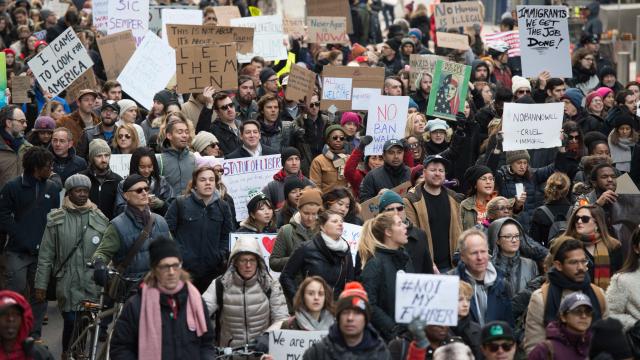Earlier this week, the US Supreme Court ruled that parts of Donald Trump’s travel ban were acceptable, leading the State Department to create a set of new guidelines on the ban, which applies to nationals from Iran, Libya, Somalia, Sudan, Syria and Yemen, with a few exceptions. To travel to the US from those six Muslim-majority countries, travellers must prove they have a “bona fide relationship” with “a person or entity in the United States” that was “formed in the ordinary course, rather than for the purpose of evading” the ban. The guidelines are now being enforced as of this morning.
Photo by Bryan Smith/Getty Images
The New York Times has made an interactive guide on who is allowed into the US and who isn’t.
Who Is Allowed
The court ruled that the travel ban couldn’t be imposed on anyone with a “bona fide relationship” with “a person or entity in the United States”. The Trump administration has clarified what that means. According to The New York Times, “close family” includes parents (including parents-in-law), spouses, children, adult sons or daughters, sons-in-law, daughters-in-law, and siblings (including step-siblings). But it doesn’t include grandparents, grandchildren, aunts, uncles, nieces, nephews, cousins, brothers-in-laws and sisters-in-law, fiancés, and any other extended family members.
A “bona fide” relationship with an entity could include speaking at a university in the US or taking a job from a company in the US. But it exempts companies and nonprofits from creating relationships — like calling people “clients” — to help people avoid the ban.
Green card holders, dual nationals, American citizens and diplomats will be allowed into the US. Diplomats include UN visitors, NATO officials, international representatives, and others with A-1 or A-2 visas.
Students and workers would be allowed entry into the US, regardless of if they have visas or not. They are already qualified for non-immigrant work visas because they have “bona fide” relationships in the US. In 2015, there were 13,000 temporary visits from students and workers from the six countries.
Who Might Be Allowed
Tourists and business travellers would need non-immigrant visas to travel to the US. Otherwise, they would need to prove that they had a “bona fide” relationship with someone or an entity from the US.
People with new immigrant visas who have obtained their visas through employment or family status would not be banned from entering the US, but those who received their status through a lottery would not be able to enter if they’re unable to prove a “bona fide” relationship with someone or an entity in the US.
Refugees are barred from entering the US for 120 days. However, refugees with “bona fide” relationships with people in the US would be allowed entry, and refugees who have already entered the US would be allowed to stay. It’s unclear if refugees connected to resettlement agencies will be allowed to enter the country or not.
Who’s Barred
Anyone else who doesn’t meet these criteria and is travelling from the six countries will be stopped from entering the US for the next 90 days.
The Supreme Court will make a final ruling on the travel ban in spring.

Comments